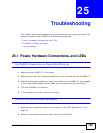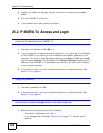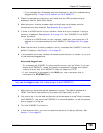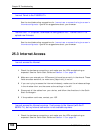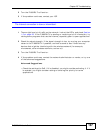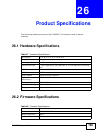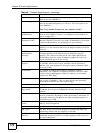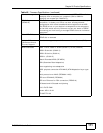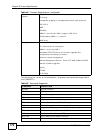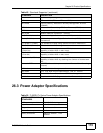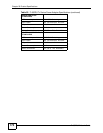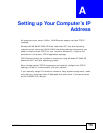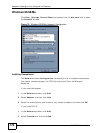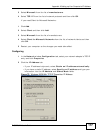
Chapter 26 Product Specifications
P-660RU-Tx User’s Guide
170
DHCP Server IP Pool 192.168.1.32 to 192.168.1.64
Device Management Use the web configurator to easily configure the rich range of
features on the P-660RU-Tx.
Firmware Upgrade Download new firmware (when available) from the ZyXEL web site
and use the web configurator, an FTP or a TFTP tool to put it on
the P-660RU-Tx.
Note: Only upload firmware for your specific model!
Configuration Backup
& Restoration
Make a copy of the P-660RU-Tx’s configuration. You can put it
back on the P-660RU-Tx later if you decide to revert back to an
earlier configuration.
Network Address
Translation (NAT)
Each computer on your network must have its own unique IP
address. Use NAT to convert your public IP address(es) to multiple
private IP addresses for the computers on your network.
Port Forwarding If you have a server (mail or web server for example) on your
network, you can use this feature to let people access it from the
Internet.
DHCP (Dynamic Host
Configuration
Protocol)
Use this feature to have the P-660RU-Tx assign IP addresses, an
IP default gateway and DNS servers to computers on your
network. Your device can also act as a surrogate DHCP server
(DHCP Relay) where it relays IP address assignment from the
actual real DHCP server to the clients.
Dynamic DNS
Support
With Dynamic DNS (Domain Name System) support, you can use
a fixed URL, www.zyxel.com for example, with a dynamic IP
address. You must register for this service with a Dynamic DNS
service provider.
IP Multicast IP multicast is used to send traffic to a specific group of
computers. The P-660RU-Tx supports versions 1 and 2 of IGMP
(Internet Group Management Protocol) used to join multicast
groups (see RFC 2236).
Time and Date Get the current time and date from an external server when you
turn on your P-660RU-Tx. You can also set the time manually.
These dates and times are then used in logs.
Logs Use logs for troubleshooting.
Universal Plug and
Play (UPnP)
A UPnP-enabled device can dynamically join a network, obtain an
IP address and convey its capabilities to other devices on the
network.
Firewall Your device has a stateful inspection firewall with DoS (Denial of
Service) protection. By default, when the firewall is activated, all
incoming traffic from the WAN to the LAN is blocked unless it is
initiated from the LAN.
IP/MAC Address
Filters
Your device’s packet filtering function allows added network
security and management.
Application Filter Application filter allows you to block instant messaging programs.
URL Filter URL filter allows you to block access to Internet web sites that
contain key words (that you specify) in the URL.
QoS (Quality of
Service)
You can efficiently manage traffic on your network by reserving
bandwidth and giving priority to certain types of traffic and/or to
particular computers.
Table 48 Firmware Specifications (continued)




